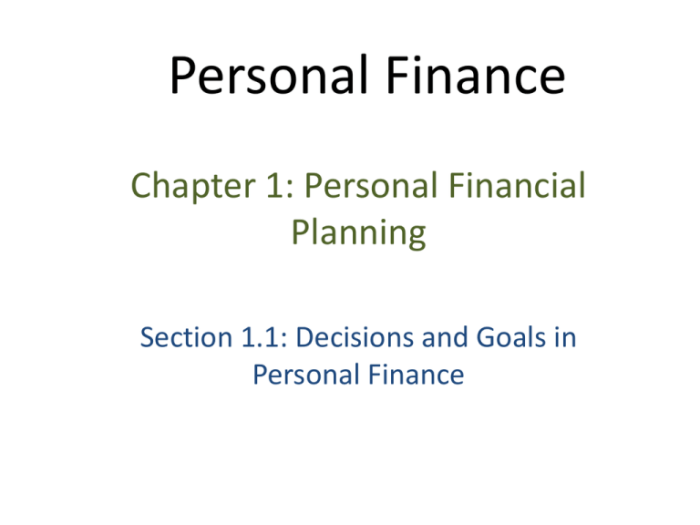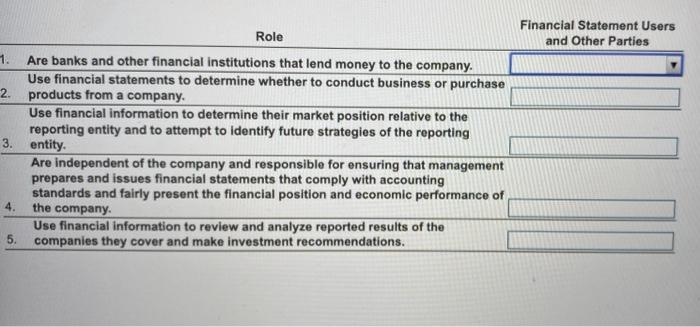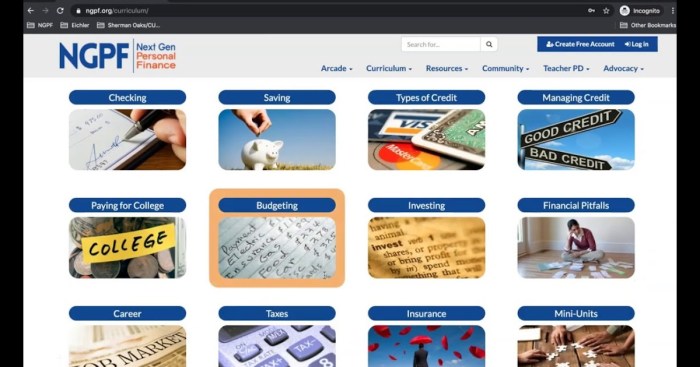Foundations in personal finance chapter 1 answer key pdf – Unlock the foundations of personal finance with our comprehensive Chapter 1 Answer Key PDF. This guidebook provides an in-depth exploration of financial literacy, empowering individuals to make informed financial decisions that enhance their overall well-being.
Delve into the core components of personal finance, including budgeting, saving, investing, debt management, insurance, and financial planning for life events. Gain practical insights and strategies to navigate the complexities of personal finance with confidence.
1. Personal Finance Foundations

Financial literacy is crucial for personal well-being, empowering individuals to make informed financial decisions that enhance their lives. It encompasses budgeting, saving, investing, managing debt, and planning for future financial goals.
Key components of personal finance include:
- Budgeting: Creating a plan for managing income and expenses
- Saving: Setting aside money for future needs and emergencies
- Investing: Growing wealth through the purchase of assets
- Debt management: Repaying debts effectively while minimizing interest
- Insurance: Protecting against financial risks and unforeseen events
- Financial planning: Preparing for major life events and long-term goals
Financial decisions can significantly impact overall well-being. For instance, effective budgeting can reduce stress, improve financial stability, and promote financial security. Conversely, poor financial decisions, such as excessive debt or inadequate savings, can lead to financial distress, anxiety, and even health problems.
2. Budgeting and Cash Flow
Creating a Comprehensive Budget Template
A comprehensive budget template should include:
- Income: All sources of income, such as salary, wages, and investments
- Fixed expenses: Expenses that remain relatively constant, such as rent, mortgage, and car payments
- Variable expenses: Expenses that fluctuate, such as groceries, entertainment, and transportation
- Savings goals: Amounts allocated for specific financial goals, such as an emergency fund or retirement
Tracking Expenses and Income Effectively
Effective expense and income tracking involves:
- Recording all expenses and income in a budget or spreadsheet
- Categorizing expenses to identify areas of spending
- Regularly reviewing and adjusting the budget based on actual expenses
Difference between Fixed and Variable Expenses
Fixed expenses are those that remain relatively constant, such as rent, mortgage, and car payments. Variable expenses fluctuate depending on consumption, such as groceries, entertainment, and transportation.
3. Saving and Investing

Creating a Savings Plan
A savings plan involves:
- Setting financial goals and determining the amount needed to achieve them
- Automating savings to make it a regular habit
- Taking advantage of employer-sponsored retirement plans, such as 401(k)s
Different Types of Investment Accounts and Their Risks
Common investment accounts include:
- Savings accounts: Low-risk accounts that offer low returns
- Certificates of deposit (CDs): Time-locked accounts that offer fixed interest rates
- Money market accounts: High-yield savings accounts that offer check-writing privileges
- Bonds: Loans to companies or governments that pay interest
- Stocks: Shares of ownership in companies that can fluctuate in value
Importance of Diversification in Investment Portfolios
Diversification is spreading investments across different asset classes and investments to reduce risk. By diversifying, investors can minimize the impact of losses in any one investment.
4. Debt Management
Comparing Different Types of Debt, Foundations in personal finance chapter 1 answer key pdf
| Type of Debt | Interest Rates | Repayment Terms | Impact on Credit Score |
|---|---|---|---|
| Credit Cards | High (15-30%) | Short-term (usually within a month) | Significant impact if not paid on time |
| Loans | Varies depending on type of loan (e.g., personal loans, car loans) | Long-term (usually several years) | Positive impact if paid on time |
| Mortgages | Lower than credit cards and personal loans | Long-term (usually 15-30 years) | Significant impact if not paid on time |
Impact of Debt on Credit Scores
Debt can negatively impact credit scores if not managed effectively. Factors that affect credit scores include payment history, amount of debt, and length of credit history.
Strategies for Managing and Reducing Debt Effectively
- Creating a debt repayment plan
- Consolidating debt to lower interest rates
- Seeking professional help if unable to manage debt
5. Insurance and Risk Management
Purpose and Importance of Insurance
Insurance provides financial protection against unexpected events, such as accidents, illnesses, and property damage. It helps individuals and businesses manage risks and minimize financial losses.
Overview of Different Types of Insurance Policies
- Health insurance: Covers medical expenses and healthcare costs
- Life insurance: Provides financial support to beneficiaries in the event of the policyholder’s death
- Property insurance: Protects against damage or loss to property, such as homes and vehicles
- Liability insurance: Covers legal expenses and damages caused by the policyholder
Factors to Consider When Choosing an Insurance Provider
- Financial stability and reputation of the company
- Coverage options and premiums
- Customer service and claims handling
6. Financial Planning for Life Events

Financial Planning for Major Life Events
Financial planning for major life events involves:
- Marriage: Budgeting for shared expenses, managing joint finances
- Retirement: Saving for retirement, planning for healthcare expenses
- Children: Education planning, setting up savings accounts
Saving for Education and Other Long-Term Goals
Saving for long-term goals involves:
- Setting financial goals and determining the amount needed
- Automating savings to make it a regular habit
- Investing in appropriate investment accounts
Importance of Estate Planning
Estate planning involves creating a will or trust to ensure that assets are distributed according to the individual’s wishes after their death. It also helps minimize estate taxes and probate fees.
Helpful Answers: Foundations In Personal Finance Chapter 1 Answer Key Pdf
What is the importance of financial literacy?
Financial literacy empowers individuals to make informed financial decisions, manage their finances effectively, and achieve their financial goals.
How can budgeting help improve financial well-being?
Budgeting provides a framework for tracking income and expenses, enabling individuals to identify areas for improvement, reduce unnecessary spending, and allocate funds towards essential needs and financial goals.
What is the role of diversification in investment portfolios?
Diversification reduces investment risk by spreading investments across different asset classes and industries. This strategy helps mitigate the impact of market fluctuations and enhances the potential for long-term returns.

